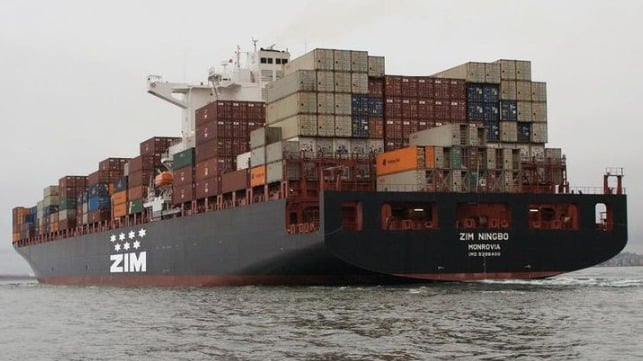Israeli Carrier Zim Reroutes Ships to Manage Security Risks

Israeli carrier Zim has had to deal with multiple operational disruptions since terrorist group Hamas launched an attack on Israel on October 7. While Israel's container ports remain fully operational, an estimated 10 percent of staff at the key container port of Ashdod have been called up for military service - as have many of Zim's own employees. It has also had to adapt to a new insurance cost environment for coverage in Israeli waters, and it is passing on a war-risk surcharge to its customers. Its latest challenge: managing the risk of an attack by Hamas-aligned Houthi militants in the Red Sea.
Zim operates services to and from the Far East on the main trunkline route through Suez and Bab el-Mandeb, one of the busiest maritime highways in the world. Since the start of the Israeli operation in Gaza, this route has become more hazardous for ships with ties to Israel. Two Israeli-linked vessels, the car carrier Galaxy Leader and the product tanker Central Park, have recently been attacked off Yemen. (The latter attack was carried out by Somali pirates, according to the U.S. Navy, though it is as yet unclear whether the Somali attackers may have had a commercial arrangement with Houthi forces.) A third vessel, the boxship CMA CGM Symi, was hit by an Iranian-built suicide drone in the Indian Ocean over the weekend.
To manage the risk, Zim announced Monday that it is taking "temporary proactive measures" to reroute some of its ships. "Longer transit times in the relevant Zim services are anticipated, though every effort is being made to minimize disruptions," the company said in a statement.
AIS data provided by Pole Star confirms that at least one ship, the Zim Europe, has diverted from her usual Suez route and is now transiting south around the Cape of Good Hope. The diversion will add thousands of miles onto her journey from Boston to Port Klang.
The carrier did not say which of its vessels would be sent on longer voyages around Africa, but the extra fuel charges and wages will add further pressure on the company's finances. Zim announced a loss of $2.2 billion in the third quarter, including a $2 billion non-cash impairment charge. Like all shipping lines, Zim faces pressure from falling freight rates, which have returned to normal levels after the surge seen during the pandemic, but the charge stemmed largely from a writedown on the value of its vessels and containers ($1.6 billion and $400 million, respectively).

that matters most
Get the latest maritime news delivered to your inbox daily.
Luckily, according to analysts, Zim is sitting on a large cash stockpile left over from the boom years.
"Our analysis indicates that Zim’s quarterly cash burn rate is approximately $300 million, suggesting that its existing cash reserves could sustain operations for about nine quarters, or roughly 2.3 years," Clarksons Securities analyst Frode Mørkedal said in a recent client note. “This duration should be sufficient to weather market challenges at least through 2025."
